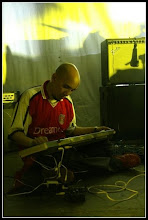
When the inexorable rise of the Compact Disk finally lifted the stylus on the vinyl records market toward the end of the 20th Century, record collectors let loose a collective howl of anguish.
The slow decline of the Compact Audio Cassette has evoked a more muted response, and yet we shouldn't forget the impact tapes have had on music culture.True, tapes never really supplanted vinyl in music lovers' affections.
The lush artwork that graced a 12" album cover was diminished when shrunk to cassette size, while a Hawkwind vinyl gatefold sleeve, say, made a better surface for rolling joints.
Cassettes never sounded as good as vinyl, occasional pop and crackle preferable to muffled high-end and tape hiss. You couldn't skip to a preferred song with the ease of picking up and dropping the needle. And cassettes were shockingly vulnerable, to heat, moisture and magnets, the spools of tape often chewed up in the gears of a malfunctioning cassette deck.
Tape's USP was that it was portable, and you could record on it, freeing car stereos from the tyranny of the radio DJ, and enabling consumers to duplicate their record collection--or, indeed, a friend's record collection, thus unwittingly initiating the death of the Record Industry.
Manufacturers cannily fetishised such acts of piracy, marketing a myriad variety of cassettes, in black, coloured or transparent plastic, daubed with logos and decals and bewildering-but-impressive techno mumbo-jumbo like ‘HIGH BIAS', ‘EPITAXIAL' and ‘ANTI-RESONANCE CONSTRUCTION'.
If you were serious about your taping, you always bought Chrome or Metal cassettes, never employed "High-Speed Dubbing," and never ever used C120s, which were prone to stretching.
Home Taping Was Killing Music, the Record Industry claimed, but the opposite was true. The increased portability of cassette recorders aided the efforts of the bootleggers who, in the 1970s, risked a roughing-up by Led Zeppelin manager Peter Grant if caught taping the Zep. Many now, however, are grateful for the bootleggers' illicit activities, and the archives of demos and live performances they have furtively preserved.
Home Taping was, in fact, democratizing the Record Industry. Affordable 4-track cassette recorders turned every musician's bedroom into a studio, Lo-Fi pioneers Robert Pollard and Lou Barlow waxing rhapsodic over 4-track's warm, fuzzy sound. Tape-to-tape recorders served as pressing plants for a cottage industry of DIY cassette-only labels, selling via mail order or West London's Rough Trade shop. Subterranean genres like industrial, grindcore and lo-fi flourished in this hermetic, anarchic market, while DJ-produced mix-tapes have long been a staple of Hip Hop culture.
The home-made mix-tape was, however, the cassette's most endearing and enduring gift to Pop. The mix-tape turned us all into radio programmers, forcing our favourite songs upon our friends via painstakingly compiled and decorated cassettes that celebrated our uniquely wonderful taste in music, or expressed our feelings via the medium of other peoples' songs. CD-Rs sound "better," perhaps, but an actual mix-tape--where the compiler has had to sit and listen to every song as they taped it for you--offers a wholly more intimate experience than simply clicking and dragging some mp3s in iTunes.
The cassette tape finally ran afoul of the capstans and cogs of fate with the arrival of affordable CD Walkmans and domestic CD-R hardware, its USP not quite so Unique anymore. Some cassette-only labels survive, esoteric operations like Noise label American Tapes, whose releases come encased in squashed paint-cans and found-art sculptures.Mostly, though, tapes are relics of a past age adorning hip twentysomethings' apparel and accessories, fetishised with a mixture of irony and nostalgia, as Generation Xers eulogized the 8 Track Cartridge a decade before them. Consider it a most pop-cultural form of immortality.

No comments:
Post a Comment